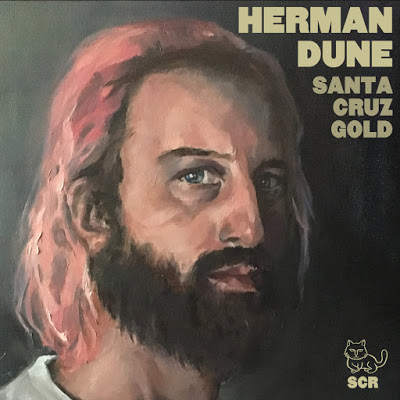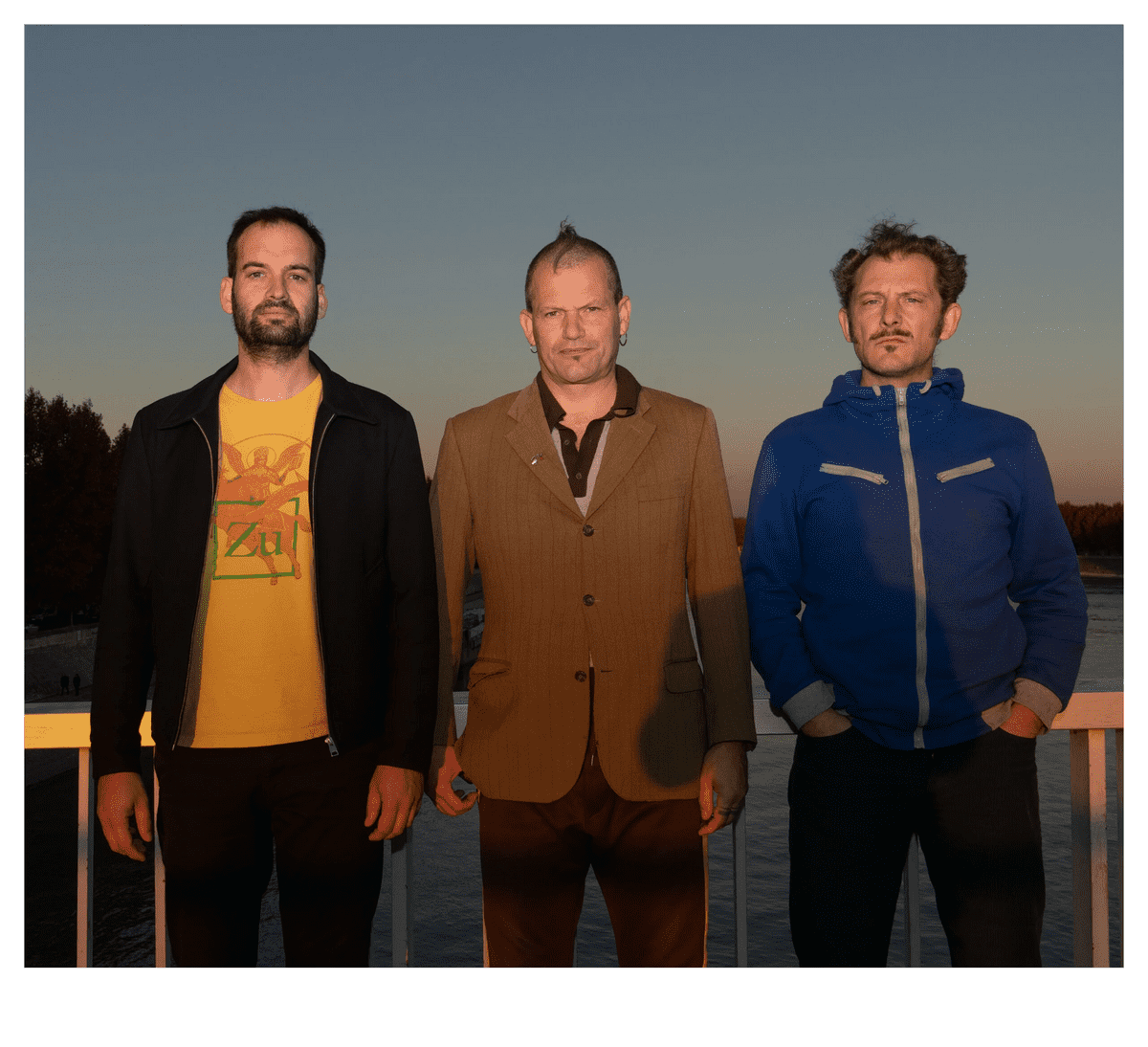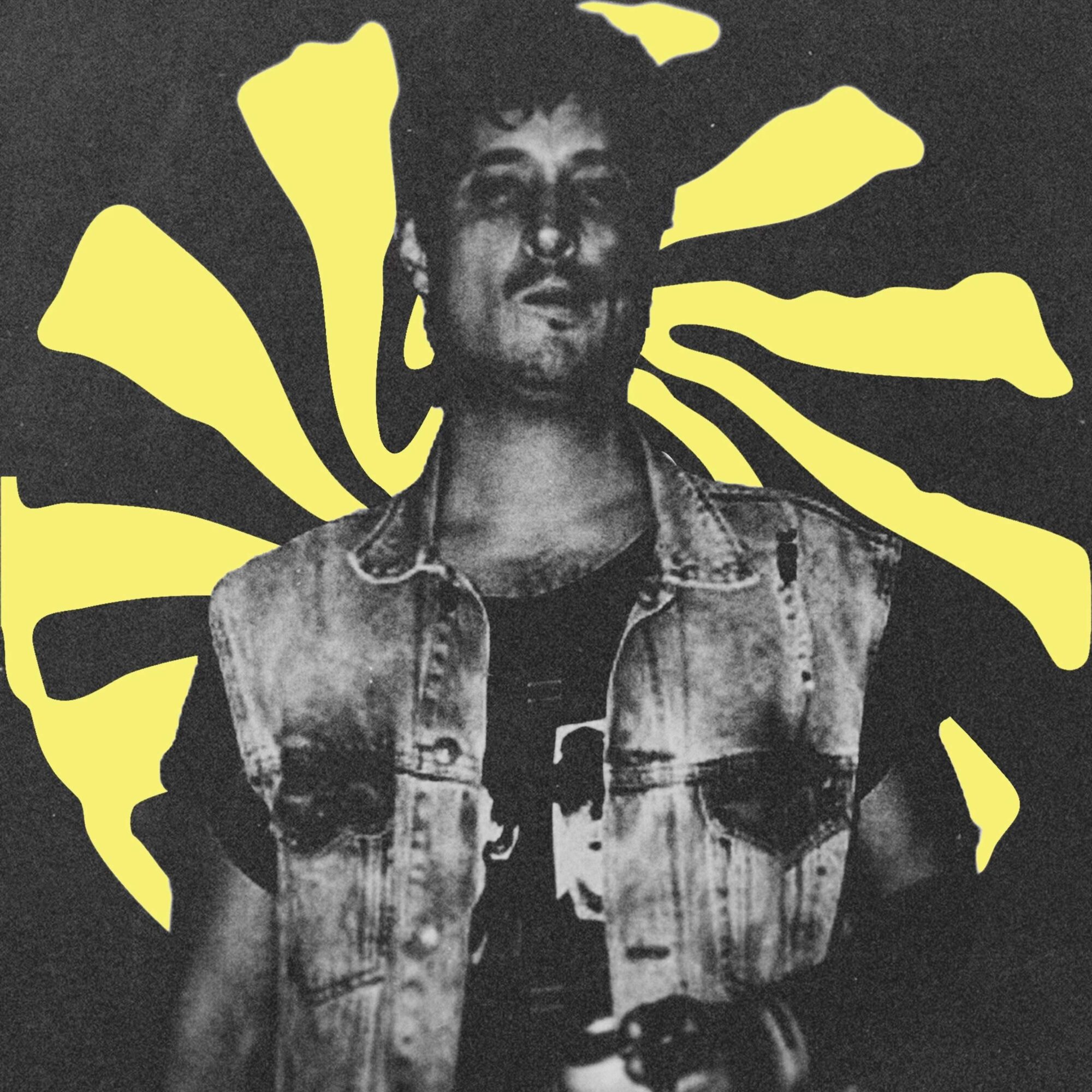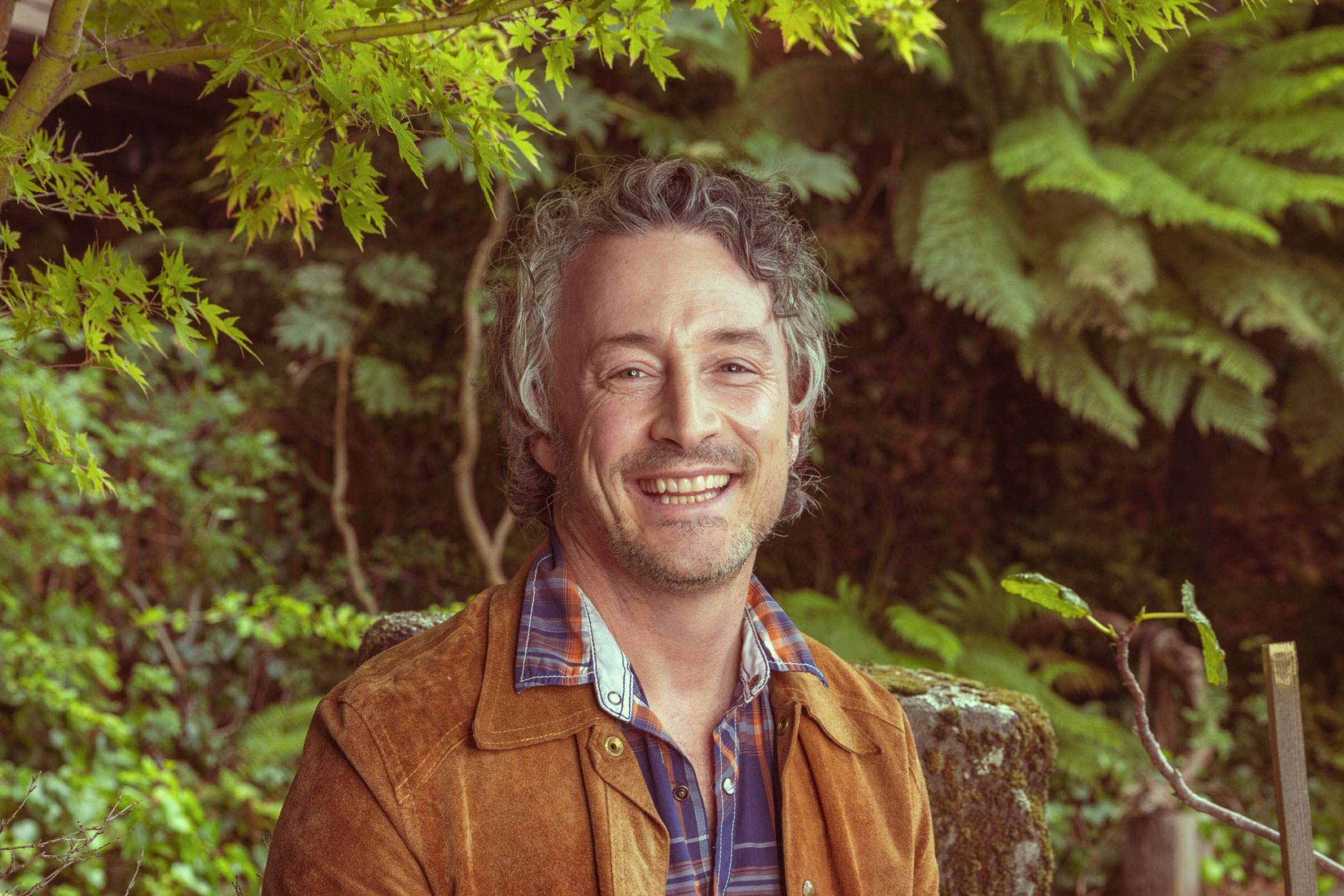David Ivar Herman Düne discusses his latest release Santa Cruz Gold with Zack Kopp
David-Ivar Herman Düne was born in Paris in 1976, to a Moroccan father and a Swedish mother. He lives in San Pedro, California. As a musician, he’s been known as Herman Dune, Yaya, David Ivar, and Black Yaya since 1999, releasing records and touring the world. David Ivar is a visual artist, of ink, watercolors, oil, pencils, collage and sculpture. These works have been seen around the world since 2006. When he began playing anti-folk—some people call it acoustic punk—in Paris in the 90s, no DIY scene existed, neither any songs performed in English. With two releases this year, Sweet Thursday and Santa Cruz Gold, David-Ivar has resumed the driver’s seat of the musical undertaking bearing his surname, following the dissolution of Herman Düne mark one after sacrificing any profit from the aborted production Chasing Bonnie and Clyde. I first spoke with David-Ivar last just after this unfortunate turn, and he was generous enough to release the entire soundtrack free online as a gift to the world and a nice way of washing his hands of that mishap, also releasing a collection called Black Yaya that was hard to find in the U.S., some samples of which are available on YouTube.
Tell me about this new release, Santa Cruz Gold.
I really dig these songs, and two of my favorite songwriters, Turner Cody and David Berman, told me they were my best ones, so there’s no better review I could hope for, except maybe if I heard that Bob Dylan bought the album! I played everything, except for the saxophone by Jon Natchez who played on Giant and Next Year In Zion, is a member of War On Drugs and regularly plays with David Byrne and Arcade Fire, and the pedal steel by Spencer Cullum Jr, a fantastic player from Nashville whom I met through Caitlin Rose and has his own project called Steelism. I don’t know, it took me a while to release this, because at some point, it almost got a big release on a big label, and then they dropped out and I got depressed for a while. David Berman, aka The Silver Jews, really helped me out about it, sort of coaching me about the whole process, pointing things and editing stuff, which was amazing to me because I loved the Silver Jews long before I ever started touring. The cover art is a self-portrait I painted, it’s oil on wood.
Several songs feature female background vocals, reminding somewhat of the old days, while remaining distinctly their own thing. A few words on that alchemy, please.
I was super happy to have Caitlin Rose sing on a few tunes. I met her at a show of mine in Nashville and she gave me her album, I love her songs so much, her writing sharp and funny, her voice so beautiful, she really impresses me. I was so glad to get her to sing. I got Jolie Holland to sing and play fiddle on a song too. Jolie is a very good friend, and a hero of mine. We play together very often as we both live in LA, I just love her very much. On all songs, Mayon, my partner in life, and a fantastic artist first, sings with me. It’s the first time I ever record a chorus in French, for the song “Undiscarded Jacaranda”, and I love her sweet voice on it. It’s the second album of mine that I play drums for, after the Black Yaya album, and it was fun to record the drums with two little microphones.
“Life on the Run” is a great song with great lyrics, and the video is great [NOTE to READERS; You Are the Promoter].
I chose to start Santa Cruz Gold with this song and released it as a video because it makes for an accurate introduction to the whole album in my opinion. A lot of what I was thinking about while I was recording the whole album is encapsulated in this one song. It has this sound I was looking for in my studio, the comfort of DIY and the warmth of a redwood barn. Some of the lyrics totally changed meaning while I was writing, like my namedrop of Philip Roth who was alive and well when I wrote and is now not with us anymore. “Life on The Run” is the story of my life, always breathing better on the move, always suffocating when still. I take note that it’s funny that I finally express that feeling, as I came to find a home to settle down in, in the town of San Pedro, California. It is probably what made an immigrant and an artist of me, not fitting anywhere, always aspiring to be an individual amongst other individuals, with no territorial affiliation. I hope, now that I found a home, that I can still deliver!
You’re doing a fine job so far. How has life changed for you as an indie musician since moving to America?
The difference between the life of a musician in America and Europe is huge. In Europe, you could be an artist and live a normal life. I always got paid for my work. I never performed for free, and the bar owners, the venues, the theaters never complained about it, nor did they close down. I always got revenues from the radio, from the movies that used my songs, it never was a problem. I could always find a place to live and I could proudly state my profession while visiting a flat. In America, it is not so. People “let you play” for peanuts and you’re supposed to pass a hat and be thankful to the bar owner if they offer you a cup of coffee. In the USA, the birthplace of the blues and rock & roll, arguably some of the biggest human accomplishments, you starve, or you win the lottery, as an artist. Although it is the biggest economy in the world, including that of music, artists, unless they are commercial superstars, are not supposed to exist. There is no official need for culture, if it doesn’t sell, and sell tremendously at that. Like for everything, there is no research nor masterpiece here, you either pay rent or you don’t. The paradox though, I’ve got to say, is that musicians and songwriters are generally a lot better here. People know how to write, and how to play, which, more often than not, is not the case in Europe. It’s a paradox to me, because I find the hardship of being an independent artist in the USA very aggressive and destructive towards the idea of culture, and almost a proof of disdain for the intellect, and still the most beautiful art is being made here. It beats me, but in the end I’m glad I’m here, because I get to share my passion for Art with the best artists I have ever met, even if they have to be waiters or baristas, or stand at the register at Vons to bag Fritos and Lays.
I’m glad you’re still enjoying San Pedro. The new album title had me wondering if you’d moved.
To be clear, I live on Santa Cruz Street in San Pedro. Charles Bukowski used to live on this street, and I think the cat that chose to live with me is probably a descendant of one of his cats. I love it here. San Pedro is a wonderful town. Like all ports, it is populated by an array of Sea-Nations, I live up the street from the Swedish Seaman’s Church, and a few blocks from the Croatian Cultural center, I can see the ghost of the old Japanese Fishing village from my window. I’m close to a dozen Mexican places of worship, a Sicilian bakery opens at 3:30AM with Italian croissants for the longshoremen, and pupusas from El Salvador are sold for $1 on the street. The only bar where you sit, and they bring you an ashtray, I think in all of California, is around the block, I don’t smoke, but something has to be said for the sweet sight of a rowdy smoky bar. I can ride my bike to the Ocean every day and my neighbors are too sweet to tell me I shouldn’t do a drum take for my album at 2:30 AM on a Sunday. Joe Hill lived here, a Swedish, Union Hero, a songwriter of genius, and a martyr of the bigotry of his time. There is a plaque to him, with the proud logo of the IWW down my block. San Pedro is a gem of a town, and I probably am making a mistake saying it aloud, because in America, no place stays hidden forever, and soon the Teslas and the Wheatgrass bars will roll in, as usual. Money makes everything ugly, and I think Pedro has little enough of it that it is a beautiful little town.
Speaking of Joe Hill, how has the current president’s crackdown on immigrants affected your life, and how has it affected your outlook on future prospects?
People here don’t necessarily realize it, but Jews in Europe have a growing sense of fear, and in my case, of anger. Europe should be sorry for a thousand years, after what it did to its Jews, and 60 years after the crimes, the voice of antisemitism is being heard again. As a European Jew, I have seen Jewish schools guarded by the army there because otherwise Jewish children would simply be attacked, these beautiful children whose parents are brave enough to leave their skull caps and side locks on. Can you imagine the feeling to see this? It broke my heart in Europe, and I don’t want to see it here. It is beyond me. I could not stand it and it really made me want to leave and throw away the key. That and my love for America, of course, I wanted to be here, and I can’t stand the thought of antisemitism growing here now, and the feeling that a majority of people would keep on going on, like nothing happened, while a group of people is suffering. What the new administration here has changed for me is, on a factual basis, very clear. Renewing an artist’s visa has become a more complicated and expensive process. When I learned about the change, I became very anxious. In terms of morals and politics, I don’t want anyone to be scared because of what they are, and I don’t think anything is being done to make it feel safer for all. I just saw the French movie “Memoir of War” by Emmanuel Finkiel, based on a book by Marguerite Duras. I would definitely recommend it. It says more than I could ever try to say here. In Europe, I used to be very defiant, and I never realized the part of entitlement that one could find in my attitude. In the US, you get a strong feeling that if you don’t sing everybody’s song, you might get the boot, so in a way you learn to keep your politics private, because you don’t want your life taken away from you. It’s very different than defying authority in a country whose holy passport you hold. The funny thing is, that, as outsiders, immigrants often have great points of view, and their opinion should be sought, you know. A lot of Americans don’t leave their country, and don’t know how things are outside, it’d be very useful for them to hear from people who haven’t been subjected to the same propaganda as they have. But in a way, I feel, people don’t want to be confronted with the fact that things they hold on to as universal problems are just the product of a system, and I feel the same way about Europeans in Europe.
Santa Cruz Gold is your second release in a relatively short period of time. What’s been inspiring you lately?
In terms of creativity, I wish I knew what triggers me. That way I wouldn’t feel the anxiety that one day it might just stop, I’d know where to go look for it. I’m inspired by nothing and everything. I could write a great song sitting at a Pizza parlor because, inspired by a stain of tomato sauce on the table cloth, or I could not be able to write a line right after I witness a mermaid making out with a leprechaun under a double rainbow, you know… It’s hard to know what is going to wire your brain in what way… I just came out of a long Steinbeck and Brautigan period. Kinky Friedman’s song “Ride ‘Em Jewboy” was to me one of the best songs ever written, of almost prophetic depth, Kinky likes to say how Nelson Mandela used to play that song every night in prison. Right now, I’m reading all the first editions of Kinky Friedman’s books I can find in used book stores and online, currently obsessing on his murder mysteries. His books are not only excellent, with great plots and thrilling sleuth work, but also have great jokes, are filled with sophisticated literary quotes, and the characters are real characters of the music scene (including himself as the PI), some of whom I’ve met. I knew him from Ratso’s (Larry Sloman) book about the Rolling Thunder tour, and in Kinky’s books, he is Holmes and Ratso’s Watson. There are a few nods to Dylan, which always make me happy, and the descriptions of New York City are exquisite. Yep, that’s what I’ve been reading mostly lately. That and Bukowski’s new poetry books (including one about cats) that his wife (who lives up the street from where I live!) still compiles out of unreleased stuff. Other than that, I read the LA Times and Random Lengths, the fantastic paper of San Pedro, whose editor James Allen managed to keep a rebellious and intellectual news outlet in a time when talking about social equality is often considered as treason.
I recently suggested looking to the anti-folk scene for musicians of integrity, thinking of yourself, Cindy Lee Berryhill, Kimya Dawson, Ed Hammel, Diane Cluck, Jeff Lewis, etc. The person I was talking to said, “Is that even a scene anymore?” and I didn’t know. How would you answer that question?
Oh, it’s pretty much still a scene, I believe. Anyone who can’t get his own crowd wants to be part of a scene. I’m sure The Strokes were happy to be in a scene before they released Last Night, and Van Morrison probably was part of a scene before Gloria, it is just a thing that makes you feel better about yourself, you know. Scenes usually only stick around as long as no one gets a break, and that has been the case for Antifolk I feel. People like to comfort themselves as a scene and call each other great when no one else does, “the heck with the world, we know what’s up”, you know? But as soon as someone gets the tiniest bit of success, it’s “why him and not me, and who does he think he is?”, which usually goes hand in hand with “he was better before, when we were the only ones who knew him”. As much as I’ve loved Diane Cluck’s, Jeffrey Lewis’s and Peaches’ music, as much as I have called them my friends, and loved them individually, and as many times as I have shared a stage with them, I’ve never felt like I was part of the scene, I’ve always loved them as who they were, I think, and I always knew that a scene was for me going to be just like hanging with a pack of wild dogs. They’ll go straight to your throat, if they can get your bone. I’m a cat person.
– Zack Kopp
© Copyright http://www.psychedelicbabymag.com/2019
Array





I appreciate y’all posting this interview, Dune is brilliant and it’s a pleasure to read some of his thoughts. Thank you. But, to put my critic hat on for a moment, I’ve read the following two sentences multiple times and still don’t understand what they mean to convey: “David-Ivar has resumed the driver’s seat of the musical undertaking bearing his surname, following the dissolution of Herman Düne mark one after sacrificing any profit from the aborted production Chasing Bonnie and Clyde. I first spoke with David-Ivar last just after this unfortunate turn, and he was generous enough to release the entire soundtrack free online as a gift to the world and a nice way of washing his hands of that mishap.” The metaphor undertaking the dissolved surname’s car stereo and musical resurrection is baffling, as is Bonnie and Clyde’s nonprofit production of abortions (with Mark?). The “first,” “last,” and “just after” seem like a good combination for smashing the tyranny of time, but make for confusing bedfellows in that sentence. Also, what happened with the Bonnie and Clyde doc that made Ivar crash his car into the abortion clinic and spend all his profits washing his hands with misfortune?